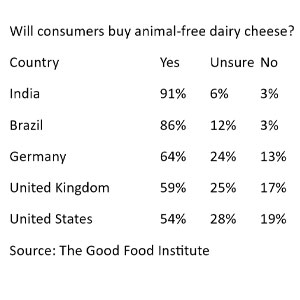WASHINGTON — Efforts to use fermentation in the production of alternative proteins are showing signs of maturation, according to a state-of-the-industry report from The Good Food Institute (GFI) focusing on fermentation in meat, seafood, eggs and dairy.
Associations are forming. Large food companies are getting involved, and the number of fermentation-enabled products are expanding. Funding and workforce constraints, however, are bottlenecks in advancing research innovation and scaling production.
Companies, appealing to consumer sustainability concerns, are using terms such as “animal-free” and “non-animal” when referring to proteins made through fermentation. Replacing 20% of per-capita beef consumption with microbial protein from sugar-fed fermentation by 2050 would reduce deforestation and related emissions by 50%, according to the report.
In the alternative protein industry, fermentation refers to cultivating microbial organisms for the purpose of processing a food stuff or food ingredient; obtaining more of the organism itself as a primary source of protein; or deriving specialized ingredients such as flavorings, enzymes, proteins, and fats, for incorporation into plant-based products or cellular/cultivated meat, the GFI said.
In precision fermentation, a form of specialized brewing uses microbes as “cell factories” for producing specific functional ingredients, including egg proteins, dairy proteins, pepsin, animal-free proteins and fats.
New associations will focus on regulatory matters and consumer perception. Early in 2023 nine precision fermentation companies across the globe formed the Precision Fermentation Alliance, which will be involved in regulatory engagement, advocacy, and marketing and communications. Founding members of a new Fungi Protein Association include the GFI and ProVeg. The new trade body will advocate for equitable and transparent policies and conduct consumer research.
The number of companies focused on fermentation for alternative proteins rose 12% to 136 in 2022. Nearly 57% of the companies were founded in the past three years. Fermentation companies raised $842 million in 2022 after record funding in 2021. Growth in funding decelerated in 2022.
“This slowdown in investments took place amid challenging macroeconomic and market conditions, including falling public equity markets, steeply rising interest rates driven by elevated inflation, the ongoing pandemic, severe climate events, and the invasion of Ukraine,” the report said.
Large food companies are financing the industry. Tyson Foods, Inc., through its venture arm Tyson Ventures, invested in mycelium startup MycoTechnology. The Kraft Heinz Co., through its investment arm Evol Ventures, invested in animal-free dairy startup New Culture Foods.
Dairy has seen rising interest as 28 companies are working on precision fermentation dairy, which allows manufacturers to use dairy in their products without the footprint of conventional dairy. Companies use Perfect Day’s whey protein from precision fermentation to launch products, including Nestle SA’s Cowabunga, a milk made with animal-free whey.

Consumer acceptance of animal-free dairy varies across the globe. When consumers were asked about their willingness to purchase animal-free dairy cheese, 91% of those in India said yes, which was followed by 86% in Brazil, 64% in Germany, 59% in the United Kingdom and 54% in the United States, according to a 2021 study from the GFI.
For the fermentation industry to grow, more facilities are needed, according to the report. Many precision fermentation facilities are configured for pharmaceutical production instead of food production, and higher staff levels would be needed for food production. Liberation Labs, Planetary and Boston Bioworks, all companies founded in 2022, are increasing production capacity.
Other industry reports from The Good Food Institute focused on cellular/cultivated meat and seafood; plant-based meat, seafood, eggs and dairy; and global policy such as public investment, regulation and labeling.
Hybrid approaches could move the alternative protein category forward. The Impossible Burger serves as an example. Impossible Foods incorporates soy leghemoglobin produced through precision fermentation into a plant -based burger.
“Ultimately, the alternative protein industry is all about producing delicious, familiar and affordable food more sustainably, securely and efficiently,” the fermentation report said. “We expect hybrid products produced with a combination of fermentation-derived, plant-based and cultivated ingredients to become common in the near future. Particularly, as the fermentation industry develops, using plant-based ingredients can help manufacturers lower end-product costs as they scale up processes.”
Want to learn more about precision fermentation and its impact on the food and beverage industry? Attend The Promise of Precision Fermentation on May 10, the latest Trends & Innovations webinar from Food Business News. Click here to register.





